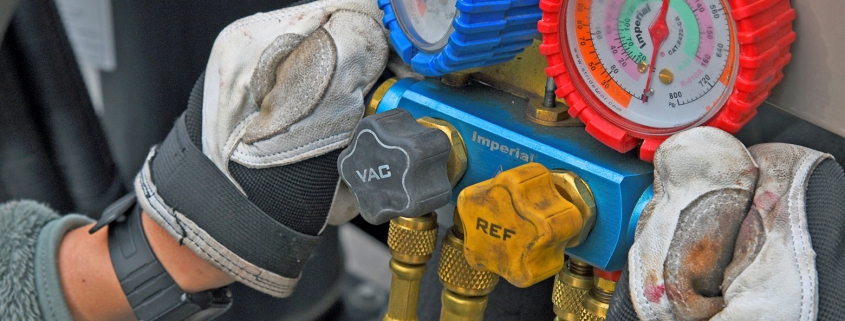Keeping track of inventory poses a big challenge for many HVAC companies because most don’t have live visibility into their inventory. Oftentimes companies don’t know what inventory items are in the warehouse, what has already been allocated to their service vehicles, and employees will pull inventory from the warehouse that is already allocated for other jobs. They then have to rush order inventory so they can fill customer orders.
Employees also often find themselves at the job site without the necessary inventory, which then triggers a trip back to the warehouse, to another service van to borrow parts, or even to the supply store to purchase inventory. This has a trickle-down effect which results in wasted costs, wasted time in transit, and wasted billable time for the company.
Rush orders are costly, and not understanding what inventory you have leads to multiple orders per vendor monthly. What’s the best possible solution?
The right ERP optimizes inventory control, reduces costs and provides a live look into your current inventory across all locations.
When a business is divided into several departments, sometimes they each will use a different software package to run their operations. An ERP combines these software systems into a single, integrated solution that’s divided into modules. Each department (finance, procurement, warehouse, etc.) will all still get their own module, but the difference is that the modules are now linked together.
ERP (enterprise resource planning) packages can tag, track, and locate every resource a company has, and with this detailed tracking, HVAC companies can accurately manage their inventory wherever it is stored – in a warehouse, storeroom or service vehicle.
An ERP system not only simplifies warehouse operations; it also promotes a culture of collaboration. When a system is linked together, it unlocks complete visibility throughout the entire organization. This facilitates communication and provides a platform where the back office, warehouse, and technicians can seamlessly connect.
This is how an ERP system makes warehouse management more efficient.
When scanner technology is combined with an ERP application, data is instantly collected during receiving, put-away, picking, and packing. Every time the status of an item changes, employees will scan it and update it in real-time. Because this data is only entered once, this helps to eliminate data duplication and cut down on inventory shrinkage. One of the main causes of a company’s shrinkage issues is when they rotate between different accounting, shipping, and manual spreadsheets. Because there isn’t a centralized system, the chances for administrative and paperwork errors increases.
With this more effective way of managing inventory, HVAC companies will always know where their inventory is and there are no questions about if an item is in transit or whether it’s still on site. Because an ERP is also a central source of information, all departments will have access to this live, updated information 24/7.
These are some other benefits of this real-time information:
• Companies can now easily track inventory on their service trucks and can even have pre-loaded inventory the night before. This saves time in the mornings because technicians won’t have to waste valuable hours in the warehouse searching for inventory, which improves efficiency and increases worker satisfaction.
• This also allows companies to increase their service calls per day by 1 appointment because technicians won’t have to pick up parts every morning (they are pre-picked the night before) and there is more accuracy with the inventory items on their service vehicles. This means that they won’t have to waste time driving across town for parts.
• Because ERP systems can often be accessed from anywhere (off-site and from mobile devices), technicians are able to share, store, and view job data while in the field. This gives them a real-time, virtual link to the back office.
• Customer satisfaction also increases because service appointments won’t take as long or won’t require multiple visits for a simple fix; and when you meet customer demands in this way, there is a greater chance of them becoming repeat customers.
An ERP Quickly Identifies Savings Opportunities and Improves Supplier Relationships
Because an ERP is a central source of up-to-the-minute information, employees can now make faster, more informed business decisions. With real-time updates of vendor and inventory information, they can quickly identify savings opportunities. An ERP also provides reliable information for more accurate forecasting.
At ABIS, our complete ERP solution determines potential suppliers of items through commodity groups, previous orders, and preferred status. It automatically requests bids from them based on inventory levels or generated quotes. Because this is a single, integrated solution, it ties together inventory with accounting and every other department within a company. This helps help you find the lowest prices, manage and track your spending, automate purchase orders based on inventory levels, and streamlines your entire supply-chain.
Investing in an ERP means that you have better resource planning, which helps improve supplier relationships. Suppliers really appreciate it when they have real-time information because this helps them gain a more complete understanding of the businesses they serve. By having this greater visibility, they can meet your needs more effectively. Delays in the supply chain will decrease, and the flow of operations will greatly improve.
The Bottom-Line
Keeping track of inventory in real-time can be a challenge for many HVAC companies, but inventory management problems don’t have to overwhelm you.
Business.com states that there is no business too small for an ERP solution because when you have real-time data, transparency, decision-making, and productivity increases. This is the secret weapon that allows every business to appear, act and operate on an enterprise-scale level. This is how you stay competitive!
When you run an HVAC business, taking the time to change and improve your warehouse and inventory management processes will make your supply chain run smoother and will lead to greater efficiency and profitability.
Let our team at ABIS help you. To learn more, please contact us today.


